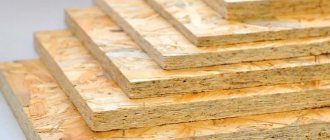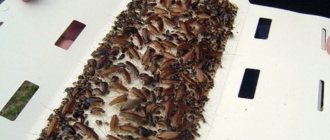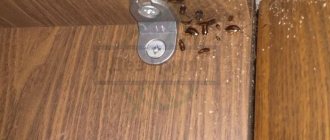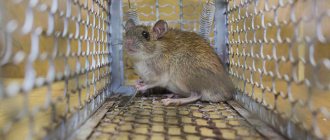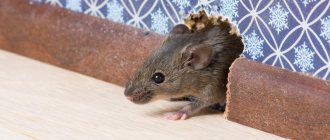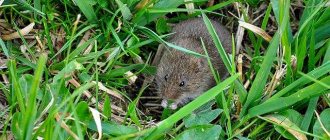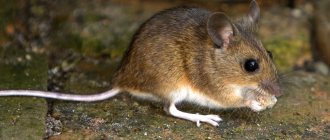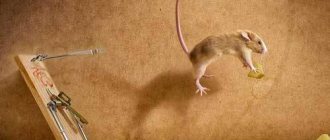Mice are pests that spoil our things, food, furniture, clothes, books, etc. The small nocturnal animal brings with it fleas and various infectious diseases. You want to get rid of mice as soon as possible, wondering what the best possible methods of rodent control are. But many of us are reluctant to use rodenticides due to our own beliefs. Here are folk remedies for mice without the use of chemicals and traps.
Carnation
It seems a little counterintuitive that cloves, which remind us of holiday baking, would be so offensive to mice. However, clove oil repels them. You can take whole cloves or clove essential oil on a cotton swab. Apply in the same way as peppermint oil: 20-30 drops on a cotton ball and spread in possible places where mice can enter. If you are using whole cloves, wrap them in an old piece of cotton T-shirt. This folk remedy will also prevent the appearance of mice.
Peppermint shapes
Peppermint emits a scent that not only helps get rid of mice, but also has beneficial effects on human health. Moreover, this method of combating small rodents indoors is the most humane. After all, the aroma of mint has an irritating effect on the respiratory system of a rodent, but does not cause death. Mice, sensing it, try to quickly leave the house in search of more favorable living conditions.
Plant
During the peppermint growing season, the easiest way to use it is with freshly picked bunches of the plant. They emit a rich, refreshing odor that mice are afraid of. To repel rodents, you need to place plant branches throughout the house and update them periodically.
As a preventative measure, it is recommended to plant peppermint around the house, which will prevent mice from even approaching the home. Moreover, it will also serve as an additional decoration, and its leaves can be used in cooking, as well as for preparing medicinal products.
Dry mint
Dry mint also helps get rid of mice. To do this, you need to prepare the plant in the summer and dry it in a dark, well-ventilated room. Dry mint should be stored in linen bags. If it is not possible to prepare the plant yourself, you can purchase the collection at a pharmacy at an affordable price at any time of the year.
Dry
Spray
Peppermint spray also repels mice. It can be prepared from a fresh plant or dried collection. To do this, add peppermint leaves (200 g) to hot water (1 l) and boil for 15 minutes over low heat. After this, cover the container with a lid and leave the solution for 1 hour, then strain and pour into a spray bottle.
Peppermint tincture
You can also use peppermint tincture against mice in the house. It is sold at the pharmacy. But this remedy can also be made at home. To do this, you need to compact the leaves of the plant tightly into a dark glass container and fill it to the top with vodka.
Infuse the product in a dark place at room temperature for a month, shaking the container daily. After the waiting period has expired, the tincture must be strained. You can store the product in a tightly sealed bottle in a dark place.
Peppermint oil
Essential peppermint oil also has a repellent effect on mice. However, it must be used against rodents in combination with other components.
Possible options for preparing the working solution:
- To repel mice, mix 15 drops of peppermint essential oil with 400 ml of warm water and add 10 drops of alcohol. And mix thoroughly.
- Mix ammonia and peppermint oil in a 1:1 ratio.
Rodent repellents should be prepared immediately before use to prevent the smell from dissipating.
Hot pepper spray
The spray consists of hot pepper. Upon contact with it, mice will experience a burning sensation in their eyes and nose, which will force them to immediately leave their cozy place.
The cooking method is as follows. Cut fresh hot pepper into pieces, about half a glass. Mix with 2 teaspoons of ground pepper, also hot. Bring 4 liters of water to a boil. Place the mixture in a bucket and then pour boiling water over it. Cover and let sit for 24 hours. Strain through cheesecloth. Next, fill any empty spray bottle with infusion, for example, a slab cleaner.
Spray around the house, in rooms, behind cabinets. Repeat in a day or two. Store unused mixture in a cool place.
Nuances
It is worth paying attention to the fact that the use of mint and preparations prepared with it is contraindicated if one of the household members suffers from low blood pressure or manifestations of an allergic reaction after contact with this plant. If you have already decided to use mint to fight mice, then it is better for residents to leave the premises while the housing is being treated, and after a walk it would not hurt to ventilate.
Whatever means and method of rodent control is chosen, the end result is much more important than the financial and time costs. By following all the recommendations, you can get rid of mice in a short period of time and prevent their appearance in the future.
Let's dispel the myths
Are folk remedies for mice effective? Home remedies, in fact, do not work at all. You will probably notice a temporary effect and perhaps a decrease in the number of pests, but these methods will not permanently get rid of mice.
Rats and mice are quite smart creatures. They know they live in a dangerous world as soon as they find a place where they can live safely from predators, have access to water and food, and would rather put up with ultrasonic waves and mint than risk leaving their new home.
Naphthalene.
It is a strong-smelling white solid. When inhaled or swallowed, blood cells lose their ability to carry oxygen. It was believed that placing mothballs near mouse nests would get rid of the rodent problem. However, it is not. The amount contained in tablets sold in stores is sufficient to kill moths and other insects, but not mice. The level of substance required for rodents should be the same as for humans. The mice won't pay any attention to it.
Even if rodents are bothered by this smell near their entrance, they will soon find or gnaw another one, a hole the size of a coin is enough for them.
And will you be happy if all your things smell of a specific aroma?
Mint.
The rooms are filled with a pleasant aroma that gets rid of mice, making it an ideal repellent? WRONG!
As in the first case, this is only possible if there is a high concentration, because mice have a sensitive sense of smell. Logically, mice live in all areas, including sewers. If they can put up with the smell coming from the smelly sewer system, then peppermint won't give them any problems.
Other folk remedies for mice are just as unreliable; let’s add hunting cats to the exception.
Application procedure
To combat mice in a house or apartment, it is necessary to place bunches of fresh peppermint or dried leaves in places where rodent droppings are found, near burrows, and also in corners in each room. As they dry out and the smell disappears, the products should be renewed so that a stable, unobtrusive aroma is constantly felt in the room.
When using a spray based on peppermint against mice, it is necessary to spray it on surfaces from a distance of 20 cm in places where rodents are expected to move and live. The treatment should be repeated every week so that the refreshing smell of the plant constantly hangs in the room. The spray can also be used simultaneously with other products.
Against pests
To repel mice with a tincture based on peppermint, you need to mix it with warm water in a ratio of 1:3 and pour it into a spray bottle. All rooms in the room should be treated with the resulting mixture, even if signs of rodents are noticed only in some of them.
You can get rid of mice in the house using an aqueous solution with the addition of essential oil, which should be sprayed in the same way as a spray or tincture. This should be done regularly at least 2 times a week so that the refreshing aroma of the plant is constantly felt in the room.
When using essential oil in combination with ammonia, it is necessary to treat all rodent habitats with a syringe. You need to repeat the procedure once a week until the signs of rodents in your home disappear.
Peppermint essential oil can also be used for wet cleaning. To do this, you need to add 30 drops to the water per 5 liters of water. But before adding essential oil to water, it must first be mixed with a small amount of detergent. The resulting solution should be used to wipe the floor and baseboards daily, paying special attention to places where rodents are expected to move.
Home protection
A great way to protect your home is to repair any damage, inside and out, to help limit easy access for mice; remember, mice can fit through the smallest of holes. A good material is sheet metal. I don’t argue that a piece of iron on the facade will not look beautiful, but it is quite possible to use it in a garage or shed.
Mice are known to chew almost anything, especially if they smell food on the other side. An exception is steel wool (wool). Fill the holes with it for ventilation. hood. This product will stop any mouse from trying to enter the house.
If you are convinced that folk remedies for mice are not for you, we suggest reading another article that briefly describes the traps.
Other
Pest control can be carried out by various means, including innovative ones. Mousetraps and other traps are not always effective. Today, consumers are presented with a wide selection of repellers for mice and other rodents that interfere with a full life and housekeeping.
Universal devices perfectly repel pests, preventing them from approaching your home. Peppermint and other folk remedies can be used as a supplement, because mice, in addition to perfect hearing, have a sensitive sense of smell, and the pungent smell of fragrant herbs will speed up the process of expelling unexpected guests.
The smell of which plants repels mice
The use of aromatic and spicy plants is a popular method of repelling rodents. It is especially relevant for people who do not want to use chemicals. “Aromatherapy” does not lead to the death of animals, it is simple, accessible and safe. It is suitable for repelling rodents and protecting against their reappearance in the house. The smell of which plants repels mice? Herbs with a sharp, bitter, peppery aroma are suitable. For rodents, this is an unpleasant, unbearable smell, from which they will try to escape, which means they will leave your home.
Black root officinalis
Medicinal black root is a poisonous plant that can not only repel, but also kill mice. Once among this grass, the animal quickly dies by inhaling toxic alkaloids. To do this, he doesn’t even need to eat black root. Mice smell a poisonous plant and avoid the grassy area.
To protect against rodents, it is necessary to prepare a poisonous solution and treat all surfaces in the house by spraying or spraying. If there is a massive invasion of mice in a room, preference should be given to a concentrated decoction or tincture. To prepare the solution:
- pour boiling water over the root or other parts of the plant in a ratio of 1:5;
- close the container and leave the solution for 2 hours;
- You can speed up the cooking process by placing the broth in a water bath for 20 minutes.
Summer residents successfully use black root to scare away mice from barns and protect the site. To do this, it is necessary to plant plants in places where rodents are most likely to appear. In autumn, dry parts of medicinal black root are stored in outbuildings, attics and basements, paying special attention to hard-to-reach places. Before leaving for the city for the winter, seeds should be scattered around the perimeter of the country house and on the veranda. You should not use black root in the house during your stay. This is a poisonous plant that can cause nausea, headaches and other unpleasant sensations.
Elder root
Elderberry root releases toxic fumes of hydrocyanic acid into the air. They repel not only mice, but also many insect pests of cultivated plants. The shrub can be planted around the perimeter of the house and outbuildings, and the root can be laid out in basements, attics, and living spaces for the winter. Surfaces can be treated with essential oil or elderberry decoction. But you should remember about safety precautions and not use a poisonous plant in the house. If possible, it is worth applying a concentrated poisonous odor directly near the rodent burrow, for example, placing a swab with essential oil or a branch next to it, after dipping it in boiling water to enhance the aroma.
Marsh wild rosemary
Swamp wild rosemary exudes an aroma that mice cannot bear. Animals try to quickly leave the area where there is an unpleasant odor. In technical buildings the plant can be used all year round. Branches should be left in a country house only for the winter, when no one lives in the room.
Blackroot, wild rosemary and elderberry are poisonous plants that must be used with extreme caution. It is recommended to wear gloves and keep children and pets away from the hazardous grass. The best option is to use poisonous herbs to protect against mice only in non-residential premises and technical buildings.
Sagebrush
Wormwood has a characteristic tart-bitter odor that can repel mice. To protect against rodents, dry stems and leaves are laid out in the barn and in the house. For some people, the smell of wormwood causes nausea and headaches. In this case, it is better to use another herb or significantly reduce its amount in the house. An alternative method of application is to treat possible places where mice appear with a decoction of wormwood.
Grouse
The hazel grouse bulb exudes a garlicky aroma. Sensing an unpleasant smell, mice will rush to leave the house and try not to return to it again. To treat the room, use a decoction and infusion from the onion and ground shoots of hazel grouse.
Peppermint
The smell of peppermint, pleasant to humans, is absolutely unbearable for mice. Dried leaves should be spread around the house or an alcohol tincture can be prepared from them. It is better to use a spray bottle to treat surfaces. Particular attention should be paid to the places where mice are most likely to appear.
In addition to the listed plants, to repel rodents from the house, you can use tomato shoots, potatoes, beans, ordinary chamomile and tansy. Many parasites and pests, including mice, avoid pyrethrum. This is chamomile powder that can be purchased at the pharmacy.
The main uses of herbs are preparing decoctions, settings, distributing fresh and dry plants throughout the house, growing on a windowsill. Residents of country houses should additionally allocate part of the area for mass planting of heather, chrysanthemums, lavender bushes and daffodils. Surprisingly, ordinary burdock is quite effective in repelling mice. This is due to the fact that rodents try to protect their fur and avoid thorny thickets.
Instead of dried plants, you can use essential oil from one or more types of herbs. You need to moisten cotton swabs with a fragrant extract and place them around the house. They should be changed regularly to maintain concentration. You can periodically wipe the surfaces in your home with cloths soaked in essential oil.
